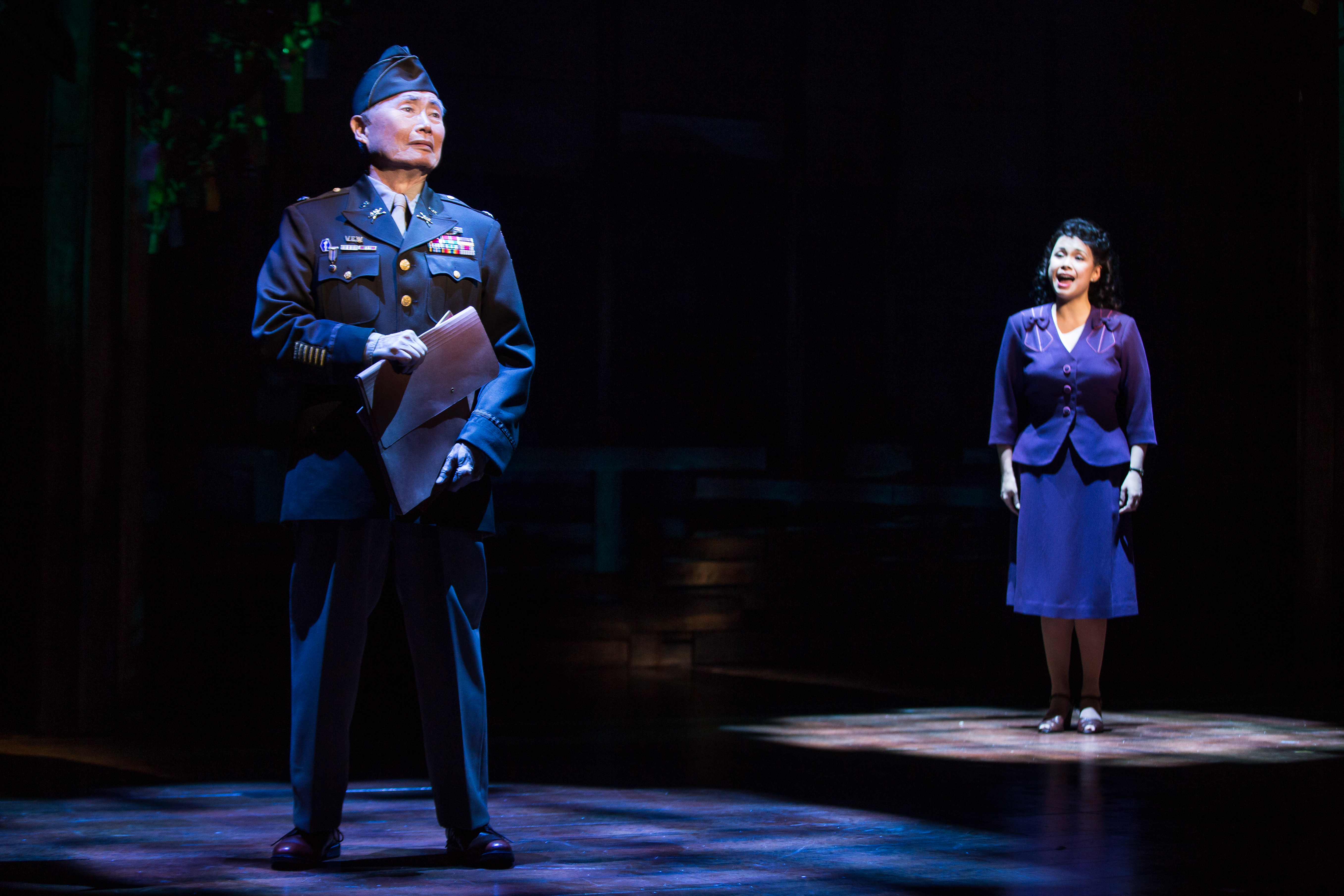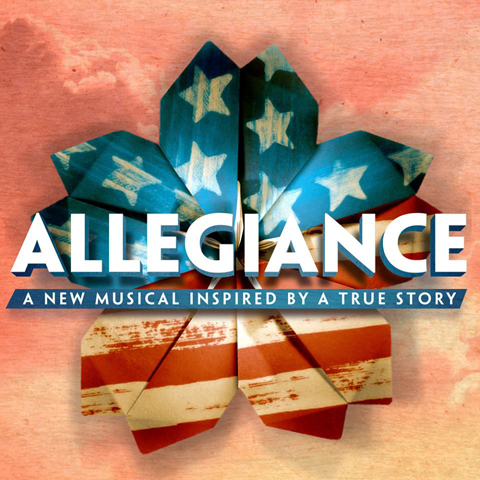 The story of Japanese American internment comes to Broadway in this new emotional musical about the Kimura family, starring Lea Salonga, George Takei, and Telly Leung. The tale unfolds at Heart Mountain in Wyoming, following a family ripped from their home by war and a community confronting injustice, facing doubts about their loyalty and patriotism. After premiering at the Old Globe Theatre in San Diego, Allegiance opened on Broadway at the Longacre Theatre November 8.
The story of Japanese American internment comes to Broadway in this new emotional musical about the Kimura family, starring Lea Salonga, George Takei, and Telly Leung. The tale unfolds at Heart Mountain in Wyoming, following a family ripped from their home by war and a community confronting injustice, facing doubts about their loyalty and patriotism. After premiering at the Old Globe Theatre in San Diego, Allegiance opened on Broadway at the Longacre Theatre November 8.
The Short Version
Do I think it’s worth seeing? Yes. Allegiance tells an important story both in terms of American history and in creating sympathetic characters who make conflicting and conflicted choices. It has flaws, both historical and otherwise (more on that later). And I don’t see it being the next big thing to sweep Broadway off its feet (I’m thinking Hamilton here) and personally I’m not about to go rushing out to buy the soundtrack.
BUT, it is gripping and emotionally compelling (I’m in good company in confessing to tears by the end) and I am glad to have seen it, to be able to talk to other people about it. Not to mention, it’s a major moment for Asian Americans on Broadway, audiences are incredibly enthusiastic, Lea Salonga is amazing, and recent events readily prove this history’s continuing importance.
The Long Version, in which there are SPOILERS, pictures, musings on historical content, and Asian Americans in musical theater…
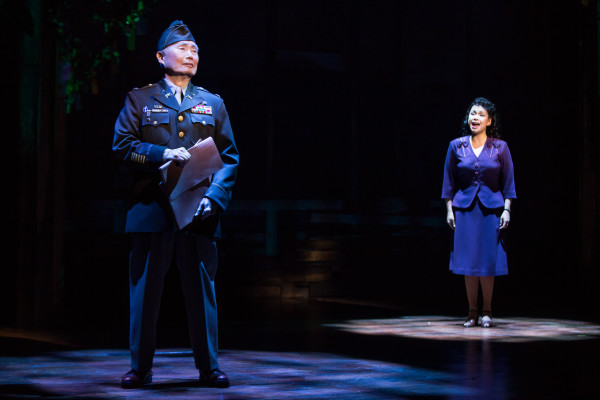
George Takei and Lea Salonga in a scene from “Allegiance” (c) Matthew Murphy
Allegiance opens in the present, with George Takei as the older Sammy Kimura, thrown back into his past by the death of his sister Kei (Salonga), whom he hasn’t spoken to in fifty years. And so we begin with a family separated by war, haunted by memories.
One of the good things about Allegiance is that it hits on many of the important historical points that I would want a musical or play about Japanese American internment to have, particularly one whose audience may know very little (or even nothing) about this unjust part of American history. While there are flaws in its historical story too–flaws that need to be considered seriously– there are these important beats included. From Kei’s plea to elder Sam to return to “a time that no one speaks of anymore,” to the economic losses Japanese Americans faced when they were evacuated (Sam and Kei’s father Tatsuo sells the farm to a long-time neighbor for $2,000, though its value was known by both to be closer to $20,000 — Tatsuo is played by Christopheren Nomura who brings a deep distinctive bass in speaking and singing voice).
We’re sent back into the past where Telly Leung plays the young Sam Kimura and Takei becomes Ojii-chan the grandfather who provides comic relief throughout the musical. After the bombing of Pearl Harbor, against his father’s wishes, Sammy wants to take action and goes with some friends to enlist but is denied, because all Japanese Americans, even citizens, have been classified as 4-C, enemy aliens. While the military officer derides them, “A Jap is a Jap,” the boys respond, “But we were born in California, we’ve never been to Japan.” Here is one of the first time, but certainly not the last, that Allegiance brings to the fore its themes of loyalty and patriotism. It also exposes what become growing internal fissures within families and within the Japanese American community at-large.
As orders go out for Japanese Americans on the West Coast to be interned, Mike Masaoka of the Japanese American Citizens League (JACL), played excellently by Greg Watanabe, becomes a key figure. Masaoka and JACL, often reviled in Asian American history for their complicity in allowing internment to unfold, are complicated.
A series of injustices are revealed as the families adjust to camp life, but also their spirit, embodied by the word, and accompanying musical number, “Gaman.” According to the Playbill, gaman was taught to the show’s writers, Marc Acito, Jay Kuo and Lorenzo Thione, by George Takei, whose reaction to In the Heights provided the seeds for this musical. It means to carry on, to endure with dignity. And it was something that Takei’s mother used to say to him while they were in camp. Thus the Japanese Americans in Allegiance’s camp have agency, a voice, and a desire to organize themselves to better their conditions.
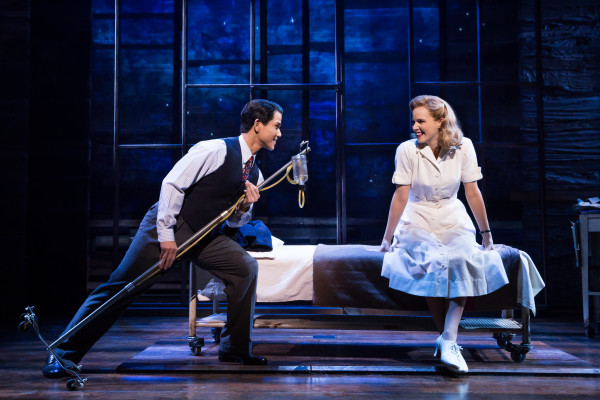
Telly Leung and Katie Rose Clarke in a scene from “Allegiance” (c) Matthew Murphy
Also introduced early on is Nurse Hannah Campbell, played by Katie Rose Clarke, who quickly morphs from distant Army nurse into Sammy’s love interest. Clarke plays the awkward and anxious nurse to a tee. On the one hand, I am thrilled by this story, because how often do you see an Asian American male kissing a white female on stage. On the other hand, anti-miscegenation laws (banning interracial marriage and interracial sex) were alive and well during World War II, not that interracial romances didn’t exist, but they were rare. It’s not until after the war that the laws are called into question, and not until the 1967 Supreme Court case Loving v. Virginia that the laws are overturned altogether. What kind of life would these two been able to live after the war, really? This is a thing that irritates me perhaps more than it should.
This issue aside, I found the historical topic Allegiance deals with most adeptly is the loyalty questionnaire. Issued to all internees, it divided the Japanese American community and made particularly evident how the American government viewed them.
Question 27: Are you willing to serve in the armed forces of the United States on combat duty, were ever ordered?
Question 28: Will you swear unqualified allegiance to the United States of American…and forswear any allegiance or obedience to the Japanese emperor?
For Sammy, Question 27 is an opportunity to prove his loyalty and patriotism (hoping that if he is heroic, his family will be freed): “I have a chance to defend my country. For Frankie, it’s the opposite and he refuses to serve: “So we can’t live freely in this country, but we can die for it.” As the two come into conflict over the issue, with Kei in the middle, both sides are presented compassionately, painting a picture for the audience in which neither is necessarily more right than the other. Meanwhile Tatsuo decides to answer no to both questions, risking deportation (to answer yes to Question 28 as a non-citizen left you country-less, no longer a citizen of Japan, not allowed to be a citizen of the United States).
As the first half closes, Sammy has enlisted in the 442nd; Frankie has chosen to resist; Kei seeks her own path; the lovebirds Sammy and Hannah, and Frankie and Kei, share kisses (Asian Americans kissing on stage!); and Tatsuo is a “no-no boy” sent to Tule Lake for his disloyalty. Their stories provide a diverse range of experiences, and each is sympathetic, no small feat for a musical.
Overall, the music of Allegiance is solid, but not what I would characterize as outstanding. My two favorite musical numbers are in the first half: Lea Salonga’s impassioned solo Higher and a spunky, cheeky dance number called Paradise, during which Frankie Suzuki (played by Michael K. Lee, recently interviewed here) takes a wry look at camp life. I was less impressed by Telly Leung’s solo What Makes a Man, the passions driving his character don’t feel like they fully bloom (acting and singing wise) until the second half.
So after intermission…in short, the 442nd goes into battle and Frankie organizes draft resisters at Heart Mountain. Frankie is arrested, Kei discovers she’s pregnant, and Hannah tries to help them. In the process, Hannah is shot by accident by a soldier guard. And here is where Frank Abe really rails against Allegiance’s problematic historical story (his comments about camp experience and the real story of draft resisters and Frank Emi who Frankie is based on are worth reading as well):
But audience members do not realize this is no longer an historical fiction of the kind promised. This World War II exists in an alternate universe, science fiction as told by Phillip K. Dick. Four men were shot and killed in America’s wartime concentration camps, each of them a person of Japanese ancestry. No white woman was ever killed in camp, much less by another white person. None. Not ever.
I agree that this was one of the more problematic plot moments, not only because of its historical implications, but also because it seemed unnecessary. At the climax of the story, Hannah’s death is one of the reasons for Sam’s falling out with his family and ensuing 50-year separation, but it would be emotional without that detail.
Nearing the end of the musical, Sammy returns to San Francisco a war hero with a Purple Heart, having watched many of his fellow JA soldiers fall in the battlefield. He meets Kei first, who tries to talk to him about how things have changed, but soon, an aged Tatsuo emerges, followed shortly by Frankie, holding his and Kei’s daughter. Tensions between father and son re-emerge as do those between soldier and draft resister. Impassioned outrage at Frankie’s wartime stance, so at odds with Sammy’s choices, bursts on stage to dramatic effect (earlier, Sammy makes a strident media statement against Heart Mountain’s draft resisters while fighting in Europe). It is this excellently acted moment, as you watch the war’s burdens tear the family apart, unable to reconcile its different war experiences, that the musical hits its emotional peak. But it is not about Hannah’s death, it’s not about the music, it’s about the unraveling of this one family that feels the most real and honest.
What Makes a Review?
As I’ve tried to think about what to say in this review, I’ve been somewhat conflicted. I liked the musical well-enough, but my jaw didn’t drop, the music–Lea Salonga’s voice aside–was pretty standard older style Broadway fare, not particularly innovative, nothing particularly surprising. The story line was well-played out, and though I found myself critical, this is an important historical story and told sympathetically on most fronts.
These questions about how many historical liberties a musical should be able to take with its subject matter also plague me. I do believe that some liberties ought to be accepted, but I’m at once sympathetic with Frank Abe’s contentions about the problems with historical details and the moments when camp was over-dramatized for theatrical effect. Some of these added fictional dramas (more violence, beatings, and firearms than actually existed) seem unnecessary–camp was bad enough. And there is a lot of history packed in, for better, for worse in terms of strict entertainment value (as the New York Times reviewer contends). And so I came to the short version, it’s worth seeing, and the long version, it has some definite pluses and minuses.
So there, that’s more or less all I wanted to say. I do hope you’ll go see it. Maybe also read a book about Japanese American internment while you’re at it to fill in the histories, but go, be swept away by the story. It deserves your thoughts, your criticisms, and even your tears.
PRO TIPS: (1) If you follow George Takei on Facebook, he’ll often link to promo codes for tickets. (2) If you live in New York City and you have time, go to the theater to get your tickets, you’ll avoid paying Ticketmaster fees, often around $10 per ticket. (3) Allegiance is running a daily digital lottery for each show, $39 a ticket, that you enter day of. (4) TKTS for discount tickets day-of (though this does involve waiting in line).
Addendum #1: Asian Americans on Broadway
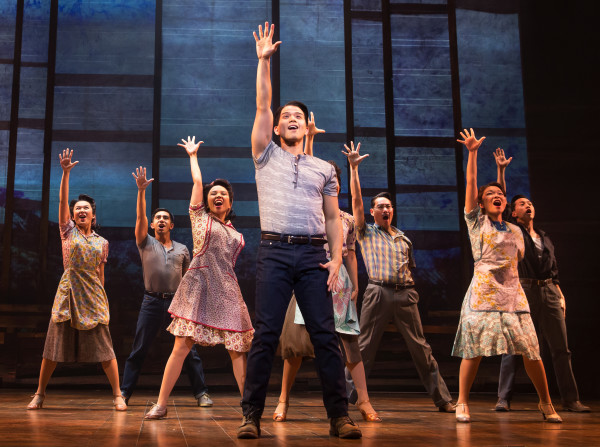
Telly Leung and the cast in a scene from “Allegiance” (c) Matthew Murphy
Ok, I lied, I have a few more things to say, if you’re still with me, and not busy finding a good deal on tickets. I think it’s worth discussing Allegiance‘s significance in terms of cast and crew. We’re talking about leads, extras, show writers (!!!) and a director (!!!) who are Asian American. So it’s distinctly Asian American in a way that previous musicals, certainly ones that made it to Broadway, have not been. So it’s a much less problematic show than either Miss Saigon or Flower Drum Song or Aladdin or The King and I (not a comprehensive list, I recognize). But then there of course is the silver lining for these previous musicals, discussed at length in this excellent is somewhat weirdly titled American Theatre piece:
For all those who criticize these works for their inauthenticity and Orientalism, there are many who welcome the opportunities these musicals have created for performers of Asian descent to create and interpret major roles in one of America’s leading art forms.
Indeed, for all the misgivings that many artists have about these works, the consensus is not that they shouldn’t be mounted anymore. What’s important now is that there’s also new work that more authentically represents the Asian and Asian-American experience, created by Asian and Asian-American teams. Kuo and Allegiance are a dramatic and long overdue step in that direction.
And in a related but different note, there’s this excellent conversation between Lea Salonga and Phillipa Soo (Hamilton), about getting Asians and Asian Americans on stage, where Salonga says, “Someone who looks like me and looks like you can have this career,” and Soo talks about creating the opportunities, so that “even though the perfect people might not be there, you create it so that more people [emerge]. There’s a catalyst. It has to start somewhere.”
So these are the kinds of things that matter too when we think about Allegiance. First to look at it on its own and then to look at it in context. Both Takei and Salonga think of it as a kind of legacy project. Someday I hope it will be less of a big deal to have a nearly all Asian American cast and more common to see Asian Americans in roles not based on their ethnicity (Salonga’s Eponine is a rare exception) and more common to see works by Asian Americans and see them in production roles, but this is progress and worth celebrating.
Addendum #2: Historical Relevance
So….this happened and I had to add it. The mayor of Roanoke, Virginia, argues that we should not accept Syrian refugees, invoking Japanese American interment as justification (WTF). He said: “President Franklin D. Roosevelt felt compelled to sequester Japanese foreign nationals after the bombing of Pearl Harbor, and it appears that the threat of harm to America from ISIS now is just as real and serious as that from our enemies then.” (Huh??!?)
Thankfully, George Takei responded in his way on Facebook. And it makes Allegiance that much more timely…(even if the mayor apologized after a bit of hemming and hawing).
If you are attempting to compare the actual threat of harm from the 120,000 of us who were interned then to the Syrian situation now, the simple answer is this: There was no threat. We loved America. We were decent, honest, hard-working folks. Tens of thousands of lives were ruined, over nothing.
Mayor Bowers, one of the reasons I am telling our story on Broadway eight times a week in Allegiance is because of people like you. You who hold a position of authority and power, but you demonstrably have failed to learn the most basic of American civics or history lessons. So Mayor Bowers, I am officially inviting you to come see our show, as my personal guest. Perhaps you, too, will come away with more compassion and understanding.
